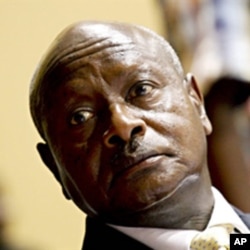The executive secretary of the Independent Media Council of Uganda says journalists have every right to criticize President Yoweri Museveni and hold his government accountable for its actions after a court declared the country's sedition law unconstitutional.
Haruna Kanaabi, who also serves as the coordinator of the East African Media Institute, said the decision of the constitutional court will embolden Ugandan journalists to practice their profession without fear of official intimidation and harassment.
“After a long, long struggle, Ugandans can now enjoy their freedom. They can criticize their leaders. They can demand accountability from their leaders through the media practitioners. And, the media can convey this message without any impediment,” he said.
Kanaabi said the government has often used the sedition law to jail both journalists and politicians as a strategic tool to silent dissent ahead of next year’s general elections.
In its ruling Wednesday, a five-judge panel ruled that the sedition law infringes on the public's right to freedom of speech guaranteed under Uganda’s constitution.
Supporters of President Museveni said the court’s decision does not give people the right to criticize the leader in the news media. They also said that the ruling means Uganda is moving towards a more democratic system.
Kanaabi hailed the ruling saying it takes away an intimidating instrument he said the government can employ ahead of elections.
“This is a big achievement in terms of people’s rights to exercise their freedom and in relation to the current period where we are approaching the elections where people are really to speak out their mind, and for the media to do its work without fear of being prosecuted,” Kanaabi said.
Experts define the sedition law as the written or spoken word calculated to incite hatred against the country’s president, government or the judiciary.
Some observers say the government can still appeal against the l court’s ruling that struck down the sedition law as unconstitutional.
Kanaabi, who was part of the team that began challenging the sedition law several years ago, said that the free speech as enshrined in the country’s constitution is meant for all Ugandans irrespective of their social standing.
“We in the media are not saying that the media should not be regulated. The media in Uganda has its professional code of conduct, managed by the Independent Media Council of Uganda where people can register their complaints if they are harassed by the media. What we are saying is that we need a media which is free, independent and responsible.”











